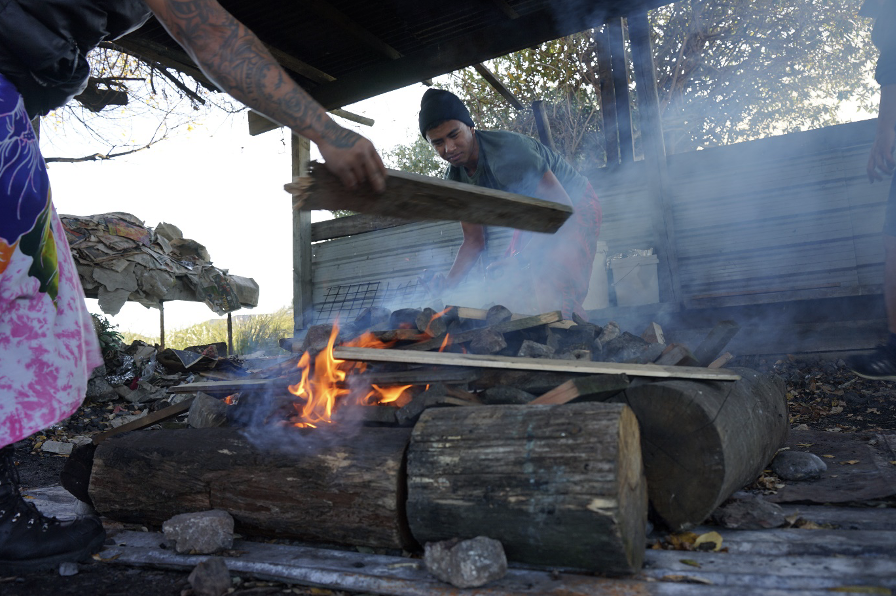CUSSA out to educate this Vaiaso o le Gagana Sāmoa
Church members heating up rocks for an umu. PHOTO/Anisha Satya.
On a cool Friday morning, smoke billows out from the Christchurch Ekalesia Fa'apotopotoga Kerisiano Samoan (EFKS).
But it’s all on purpose – members of the church are preparing an umu, better known in Aotearoa as a hāngī.
Helpers are making the food parcels, sweeping the church and stoking the fire to prepare for an outreach day.
The day was one of many organised by the Canterbury University’s Samoan Students’ Association (CUSSA) during Vaiaso o le Gagana Sāmoa (Samoan language week).
The club arranged workshops to quizzes to socials, all in the name of education.
Gagana Samoa (the Samoan language) is Aotearoa’s third-most spoken language, and it’s diverse - mainland Samoa and American Samoa use different dialects. Adonai Schwenke, CUSSA’s president, recalls the struggle this presented when he arrived in Aotearoa.
Climate activist and political science student Seanoa Leiataua illustrates a Samoan welcoming ceremony. PHOTO/Anisha Satya.
“It was kind of a culture shock,” he says. “I know how daunting it can be for Samoans coming into Aotearoa.”
Schwenke left American Samoa at a young age. He reckons he got lucky; a “social butterfly”, he was able to connect with other Samoans and built a network for himself.
“Sometimes our people don’t know how to ask for help,” he says.
Schwenke says that’s why CUSSA exists – to act as a bridge between Pasifika students and academics.
CUSSA secretary Jerry Ausage (right) shakes hands with his opponent during a volleyball match. PHOTO/Anisha Satya.
Schwenke says CUSSA nurtures “le va,” or the space between relationships that Pasifika students may have at university. The Pacific Development Team (PDT) has also played a role in nurturing the “va”.
Ofa Puleiku, the PDT’s events assistant, helps out with CUSSA’s events. It’s one of many roles the team fulfils, alongside tutoring sessions and outreach for potential UC students.
“A big part of our culture is service,” Puleiku, a Tongan brother, says. “I joined [PDT] because I saw the opportunity to help people.”
Schwenke says the PDT have set the bar for managing relationships with Pasifika students.
“The needs that some of us have are complex. It’s more than just ‘So tell me what’s wrong’. You can’t really explain it in one go.”
Lenora Taotua, a CUSSA member, grew up in the islands and moved to Aotearoa for the first time in 2012. She reiterates the importance of community for Samoan families.
“I think it has a heavy impact on migrants, and people who’ve been raised [in Aotearoa]”.
Gesturing to the church around her, and the many hands on deck, she says “we have events like this and everyone gets involved. Our elders come in, and the pre-schoolers get involved.”
“We have a lot of NZ-born Samoan kids,” Schwenke adds, “more than kids that come from the islands”. He says it’s common for New Zealand-born Islanders to feel dysphoric, stuck between their homeland and their birthplace.
“Culture is identity, and without culture or language, you don’t know who you are.”
“[Samoan Language Week] gives them a chance to reconnect with their culture.”
Taotua says the week “lets us [Samoans] bring up our culture, and continue to embrace our culture and community.”
“We’re more than happy for [others] to learn about our culture,” she adds. “It makes us happy and gives us pride.”
Schwenke thanks everyone who attended events over the week.
“Thank you for coming along. We really appreciate every one of you.”
Seanoa Leiataua begins his workshop on Samoan customs. PHOTO/Anisha Satya.
Schwenke points out the details on a tapa cloth. PHOTO/Anisha Satya.
Puleiku demonstrates the process of making ‘ava. PHOTO/Anisha Satya.
‘Ava is passed around during the ‘ava and quiz night. PHOTO/Anisha Satya.
Helpers preparing cassava and bananas for the umu. PHOTO/Anisha Satya.








